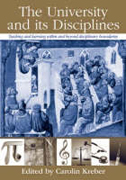
University teaching and learning take place within ever more specialized disciplinary settings, each characterized by its unique traditions, concepts, practices and procedures. It is now widely recognized that support for teaching and learning needs to take this discipline-specificity into account. However, in a world characterized by rapid change, complexity and uncertainty, problemsdo not present themselves as distinct subjects but increasingly within trans-disciplinary contexts calling for graduate outcomes that go beyond specializedknowledge and skills. This ground-breaking book highlights the important interplay between context-specific and context-transcendent aspects of teaching, learning and assessment.It explores critical questions, such as: What are the 'ways of thinking and practicing' characteristic of particular disciplines? Howcan students be supported in becoming participants of particular disciplinarydiscourse communities? Can the diversity in teaching, learning and assessmentpractices that we observe across departments be attributed exclusively to disciplinary structure? To what extent do the disciplines prepare students for the complexities and uncertainties that characterize their later professional, civic and personal lives?Written for university teachers, educational developers, as well as new and experienced researchers of Higher Education, this highly-anticipated first edition offers innovative perspectives from leading Canadian, US and UK scholars on how academic learning within particular disciplines can help students acquire the skills, abilities and dispositions they need to succeed academically and also post graduation. Carolin Kreber is Professor of Teaching and Learning in Higher Education and the Director of the Centre for Teaching, Learning and Assessment at the University of Edinburgh. INDICE: Part I. Introduction: Setting the contextChapter One: Supporting Student Learning in the Context of Diversity, Complexity and Uncertainty, Carolin KreberChapter Two: The Modern Research University and its Disciplines: The Interplay between Contextual and Context-transcendent Influences on Teaching, Carolin KreberPart II. Disciplines and their epistemological structureChapter Three (research-based): The Commons: Disciplinary and Interdisciplinary Encounters, Janet Donald Chapter Four (reactive): Academic Disciplines: Homes or Barricades?, Gary PooleChapter Five (reactive): Hard and Soft -- A Useful Way of Thinking about Disciplines? Reflections from Engineering Education on Disciplinary Identities, Bob Matthew and Jane PritchardPart III. Ways of thinking and practicingChapter Six (research-based): Ways of Thinking and Practicing in Biology and History: Disciplinary Aspects of Teaching and Learning Environments, Dai Hounsell and Charles Anderson Chapter Seven (reactive): Exploring Disciplinarity in Academic Development: Do "Ways of Thinking and Practicing"Help Higher Education Practitioners to Think about Learning and Teaching?, Nicola ReimannChapter Eight (reactive): Opening History's "Black Boxes": Decoding the Disciplinary Unconscious of Historians, David PacePart IV. Exploring disciplinary teaching and learning from a socio-cultural perspective Chapter Nine (research-based) : Guiding Students into a Discipline: The Significance of the Teacher, Andy Northedge and Jan McArthur Chapter Ten (reactive): Diverse Student Voices within Disciplinary Discourses, Jan McArthurChapter Eleven (reactive): Guiding Students into a Discipline: The Significance of the Student's View, Lewis Elton Part V. Learning partnerships in disciplinary learningChapter Twelve (research-based): Educating Students for Self-authorship: Learning Partnerships to Achieve Complex Outcomes , Marcia Baxter Magolda Chapter Thirteen (reactive): Supporting Student Development in and beyond the Disciplines: the Role of the Curriculum, Alan JenkinsChapter Fourteen (reactive): Constraints to Implementing Learning Partnership Models and Self-Authorship in theArts and Humanities, Vicky GunnPart VI. Disciplines and their interactions with Teaching and Learning RegimesChapter Fifteen (research-based): Beyond Epistemological Essentialism: Academic Tribes in the21st Century, Paul Trowler Chapter Sixteen (reactive): Exploring Teaching and Learning Regimes in Higher Education Settings, Joelle FanghanelChapter Seventeen (reactive): Teaching and Learning Regimes from within -- Significant Networks as a Locus for the Social Construction of Teaching and Learning, Torgny Roxa and Katarina MartenssonPart VII. General observations on previous themesChapter Eighteen: Assessment for Career and Citizenship, Mantz YorkeChapter Nineteen: Teaching within and beyond Disciplinary Boundaries: The Challenge for Faculty, Velda McCune
- ISBN: 978-0-415-96521-7
- Editorial: Routledge
- Encuadernacion: Rústica
- Páginas: 272
- Fecha Publicación: 01/11/2008
- Nº Volúmenes: 1
- Idioma: Inglés
